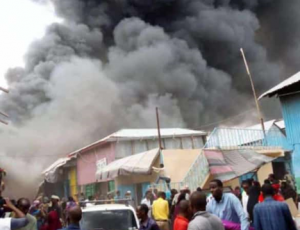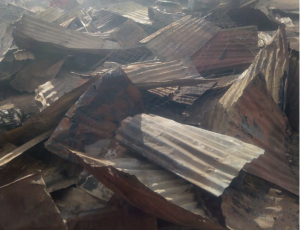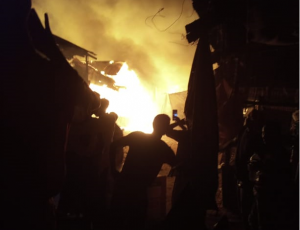Okello Oyat, Ochan Leomoi, Arte Dagane, Abdikadir Abikar, Dadaab Response Association
This blog post is part of a broader study led by the Dadaab Response Association on the impact of COVID-19 on life in the Dadaab refugee camps. Please see the new working paper for more information about the study and about the impact of COVID-19 on refugee education in the camps.
Despite restrictions on formal employment for refugees living in the Dadaab camps, running a business within the camps is a very common practice. Before COVID-19, refugee businesses in Dadaab flourished. Refugees could obtain travelling documents to go outside Dadaab and stock their businesses. Hotels were also successful and could earn a lot of money. Many incentive workers (refugees who are paid a small honorarium to work for an international organization) used to find it easier to eat at the hotels instead of preparing their food themselves, and then would pay the hotel owners at the end of every month. All agencies used to conduct workshops and seminars in the three camps, where their participants would receive food vouchers for hotels owned by refugees and the host community. This practice helped financially support refugee-owned businesses. Taxis would operate freely across the camps, carrying passengers to and from one camp to the other. Some people have specialized in moving items cheaply from one camp and selling them profitably to the other. Many youths are self-employed in the transport sector; they own motorcycles, bicycles, tuk-tuks, Altos and Pro-boxes. Beautifying businesses for men and women are common across the camps. Women own salons that have experts who design wonderful styles for their clients. These salons are also used by women and girls as an environment for social interaction, where they share views and support each other when one woman has an issue or a challenge. Some members of the refugee community also received cash or in-kind goods from fellow community members for the role of watchperson at the communal tap-stands. Each tap-stand for water collection has a member of the community who ensures water is collected in a peaceful and orderly manner.
Unfortunately, COVID and the public health restrictions put in place to respond to the pandemic had devastating impacts on refugee businesses. According to Zubair, a community worker in the camps:
It affected every part of the camp, but some people were badly affected, especially the business community. The lockdown affected transportation of goods to Hagadera and outside the camp. So, there was a decline in the economy in the camp. Those with small businesses ran bankrupt and left the market. I know some of them. Even those who were teaching in private institutions were badly affected. They were not getting payment. Even dugsis (madrasas) were affected. So, the children suffered because of education and the teachers suffered because of no work and payment. The parents suffered also; they had to care for their children all the time at home. So, some of them also closed their businesses because of the children. They did not want their children to go outside and extract the disease. Same time there is no caring center where they can take the children. So, everybody became stranded because of the disease and affected badly.
On top of the economic impact on businesses, another community worker, Fahmi, noted that remittances have also declined. He explained, “Because before Corona came, people were getting money from friends and relatives abroad. Even now collection of food has changed to two months’ interval. This has badly affected the community.” Though the COVID rules were helpful public health measures, they were woefully inadequate considering the huge need and scarcity of resources (i.e., face masks, hand sanitizers, etc.) and health personnel in the camps. As well, it had the effect of amplifying the isolation of encamped refugees who were already on the social, economic, and political outskirts of the country. The indefinite nature of the pandemic for the foreseeable future compounds other negative social effects of encampment such as limited mobility and lack of employment rights.
After the first upsurge of the pandemic, when life in the camps became normal again following the lifting of many of the public health restrictions, businesses still experienced multiple challenges. Most small-scale businesses collapsed because the owners used the capital. Even some private organizations, like the African Entrepreneur Collective (AEC), have moved to Dadaab to support refugees and the host community to thrive in business, government policies of refugee immobility and documentation are still some of the barriers in Dadaab.
Lack of proper planning in the design of markets in the three camps have also contributed to many losses. Businesses in the Dadaab camps are prone to fire, leading to major financial losses. Last year, in December 2021, the market in the Dagahaley camp was completely consumed by fire. The market in the Ifo camp has also experienced two consecutive attacks by fire. The worst one happened in the middle of the night in June 2022 and left many people with serious losses of their property. The fire was caused by electrical short-circuiting in one of the shops. People managed to contain its spread to other places, but not before the fire burned a quarter of the market.
[Click to expand]
Finally, the war between Russia and Ukraine is causing unprecedented challenges in the Dadaab refugee camps. Prices of basic commodities are rising at an alarming rate. This is a big problem in the camps, where most incentive workers earn less than one hundred US dollars a month.
Overall, from the pandemic to fires, the last few years have been devastating for refugee businesses and for the ability of refugees to be self-reliant. Combined with a rising cost of living, it is increasingly difficult for residents of Dadaab to access necessities.


